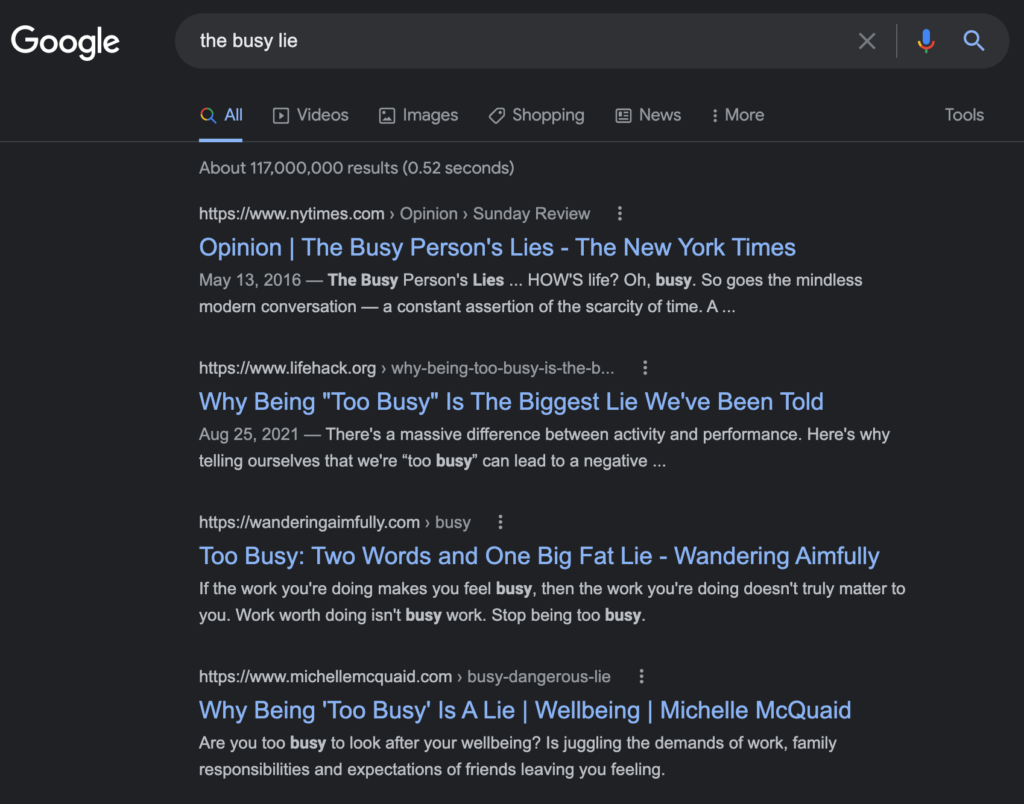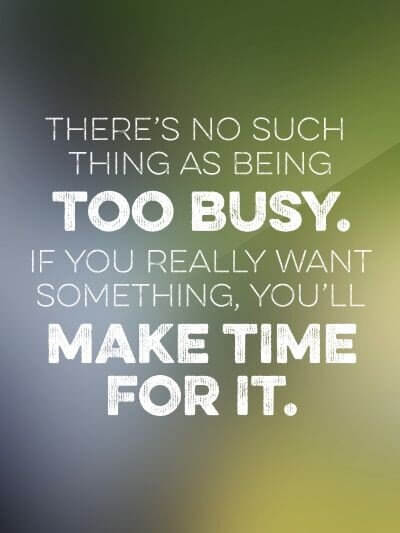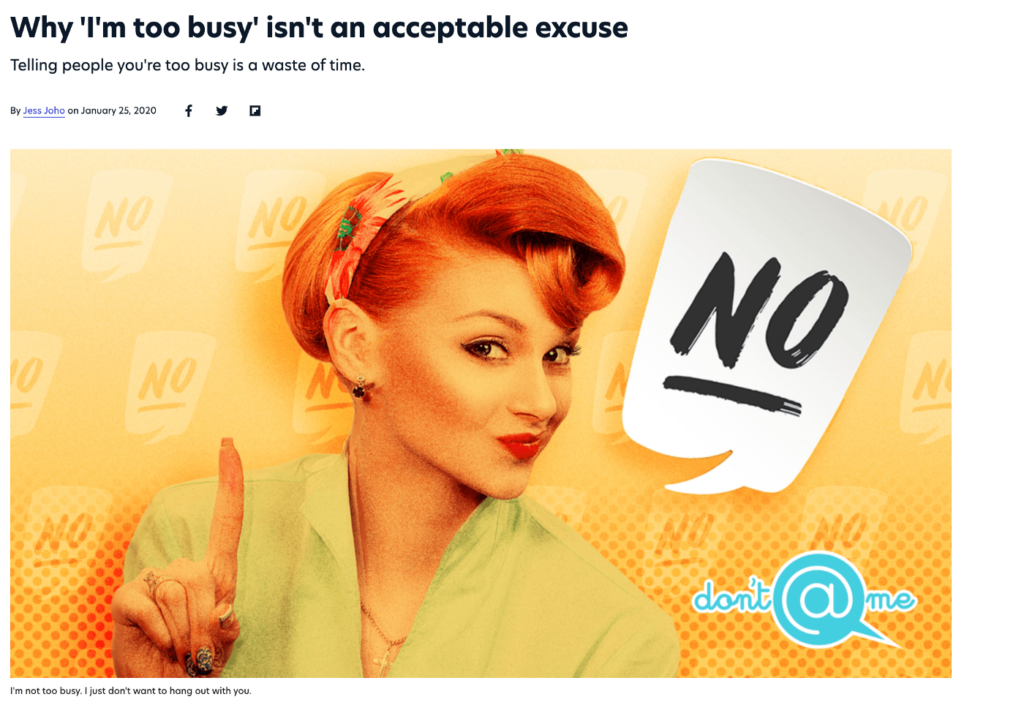It’s that time of year again. I am in 42 hours of meetings a week, and every other piece of digital media I consume says I need to “stop bragging” about being busy or admit that “being busy” is an excuse to shirk my responsibilities and not own up to the truth. Apparently, when I say I am “too busy,” I am trying to cover up the fact that I don’t want to talk to you.
As someone who worked six jobs in college to pay my bills, I have always felt ambivalent about the phenomenon of busy-shaming. I openly disavow the uniquely American hustle-based culture as a Trojan horse for exploiting workers. I also think the idea that “most of us are not too busy; we need to learn to take ownership” is actually the same concept in disguise.
This phrasing also reeks of a very particular kind of white-collar, highly educated privilege that I am especially sensitive to because I am now both white-collar and highly educated. We hate those things that remind us of parts of ourselves that we do not fully accept. I think it’s important to name this bias, as well as the fact that as a relatively even-tempered and unruffled person, this entire online conversation makes me angry. Really, really, really angry.
Every time I see an “inspirational” Instagram post, mini LinkedIn advice column, or new internet think piece stigmatizing those of who identify as “too busy,” I enter a shame spiral that ultimately leads to me overcommitting more. Which I think, at the end of the day, is the point. These posts are not simply meant to open our minds to a truth we haven’t yet swallowed; they exist to exclude and put down those who identify with the “bad behavior.”

This content works at making people feel very bad about their behavior. Across sixteen coaching sessions over the last two weeks, I have heard person after person explain it’s “their fault” things are “too busy,” and they know they should take better care of themselves. “Honestly, [they] feel really bad about it.”
The discourse around “the busy lie” may be effective at sowing the seeds of insecurity, but rhetorically and practically, I don’t believe it holds. Here’s why.
1. When we call being “too busy” an excuse, we invalidate issues of systemic inequality that must be addressed.*

Among hourly workers, the Bureau of Labor Statistics reports that “392,000 workers earned exactly the prevailing federal minimum wage of $7.25 per hour. About 1.2 million had wages below the federal minimum. Together, these 1.6 million workers with wages at or below the federal minimum made up 1.9 percent of all hourly-paid workers.”
As journalists and researchers like Barbara Ehrenreich and Matthew Demond have shown, making ends meet at these wages is virtually impossible without working multiple jobs and navigating significant challenges, such as lack of access to transportation, housing, and childcare, as well as food insecurity. These people really are too busy; they aren’t making excuses.
Of course, thought leadership about “the busy lie” isn’t typically geared towards hourly workers or Americans living below the poverty line. Instead, these critiques are aimed at white-collar workers.
The problem is that many of these people really are “too busy,” too. Since COVID-19 started, that number of people has skyrocketed. People who really are “too busy” might now be most of us.
While company leaders joke about welcoming young kids into Zoom meetings and folding laundry during international calls, they benefit from an increase in average working hours since the pandemic began. A Harvard Business School study found that the average workday increased by 8.2% or about 48 minutes since the pandemic started.
Before the pandemic, reports estimated that women were responsible for twice as much unpaid care as their man-identified counterparts. The recent global health crisis has widened this gap, with some estimates suggesting that women have added three hours of caregiving to their days — or fifteen hours per week — on top of their full-time jobs. For this reason, recent projections suggest women’s employment may not reach pre-pandemic levels until 2024, which is two years later than men’s employment.
In fact, 275,000 women left the workforce in January of 2021, according to the Bureau of U.S Labor Statistics. Since the pandemic started, women’s labor force participation has fallen to historically low levels, and women have accounted for 56 percent of workforce exits despite making up just 48 percent of the labor market.
This very small subset of data focuses only on socioeconomic status and gender identity. The added layers of racial and ethnic identity, disability, nationality and caregiver status (to name a few) further complicate the idea that people are making excuses when they don’t keep their commitments. Discrimination, harassment, racism, lack of access to sufficient healthcare and treatment, struggles with citizenship status or the status of family members, and the constant closing and opening of schools paired with the exorbitant costs of childcare mean that those in marginalized groups are managing significant pressures. And, if you happen to experience all of these hardships — well, it would be an understatement to say you are extremely busy.
Last year, I was working with a client who identified as a woman of color on a work visa. She earned a relatively high income and was raising her children in a stable partnership. She found herself forced to use sick leave and paid time off simply to fill in for childcare responsibilities when daycares and schools closed. Her husband had a more insecure job situation with fewer chances at taking time off. They found themselves struggling to balance childcare payments and send money home to India, where the COVID-19 pandemic was, in her words, “wiping out” members of her extended family. The stress of balancing a demanding job, childcare responsibilities, the loss of family to COVID-19, and trying to find the money to send for PPE and oxygen caused her to develop an ulcer and severe insomnia. She also reported trying to work longer hours because she feared losing a rare job that took care of work sponsorship for her.

In our meetings, she apologized to me for being “bad at self-care” and “not making enough time to network and to be a good friend.”
2. Eliminating “too busy” from our vocabulary is positioned as a rejection of a productivity-obsessed culture, but actually reinforces it.
One of my life mottos is “you can have anything you want; you just can’t have everything.” There are too many pulls on our attention, goals we “should” be reaching, responsibilities we feel obligated to fulfill, and dreams we think we need to be going after every day to reasonably achieve. Unfortunately, we live in a productivity-obsessed culture that emphasizes that if we don’t have everything we want, it’s because we aren’t working hard enough.
In my old office, I used to have a framed picture of a quote from Leslie Knope of Parks and Recreation: “There’s nothing we can’t do if we work hard, never sleep, and shirk all other responsibilities in our lives.” It spoke very much to the trap I felt myself living in as the breadwinner in my family starting a new company and managing unpredictable medical bills almost four years ago.
I have been taught to believe that if I simply never stop working, I can have everything I want. It’s why I secretly worked two full-time jobs when I first graduated from college, leading a double life to bat down financial insecurity. It’s why I developed insomnia that I ultimately had to seek treatment for in my last year of college when I was working six jobs, writing two theses, and competing for honors in both my majors. It’s why, ten years into my career, I experienced such acute physical burnout that I no longer produce adequate stress hormones and have to take, among other medications, adrenaline every day.
“You’re not too busy; you just don’t want to do it” actually hasn’t applied to me most of my life. And, because accepting something that isn’t true — that I don’t want to go to my friend’s baby’s baptism or offer career advice at a critical juncture — is too abhorrent, I’ve just done all of it. At great cost to me.
Just last week, my husband took the day off to make sure I could make it to the hospital on time for some very important tests. I led a 90-minute presentation before and then rushed home without eating lunch to lead a training for a team of nonprofits I really, really care about. The whole time, my friend was texting me about a work dilemma and asking if I could be a reference for them as they applied for jobs. I noticed that I developed shortness of breath and a bad headache, and it took me until 4:00 pm to eat my lunch.

But I texted my friend back, led all my presentations, and went to the hospital. I really wanted to do all of it. I like my job; it’s more work than I can do, and a seemingly endless stream of hiring hasn’t changed that fact. Still, the reality is that I want to be doing it and keeping my commitments to my employees (who I like) and clients (who I like). I want to be a good friend, so I make time for those urgent texts. I want to be healthy, so I go to the hospital. But here’s the thing — I also want to eat my lunch and be able to breathe normally.
Sometimes, there simply isn’t enough time. However, the logic that “if you really want something, you’ll make time for it” pathologizes us. The only thing standing in the way of you achieving what you want is you. Right?
This language is supposed to be empowering, but I see it as a covert mechanism for a hyper-accountable culture that seeks to write off all the social inequity and exploitation baked into our society and pin it on lazy, selfish, irresponsible individuals. The result is that people like me, who really value being reliable and trustworthy, see these messages and push harder and harder from a place of our sense of deficiency. It’s a means of social control that, whether intentionally or unintentionally, requires us to uphold the status quo of a labor-based system that devalues and deprioritizes the individual.
3. Privacy matters.

Much of the literature on “the busy lie” suggests that instead of saying you’re too busy, you should simply say why you can’t meet a commitment. The problem here is that for the most part, these articles demand you to tell the most unvarnished, vulnerable truth you have to offer.
For example, in a Mashable article on why being too busy isn’t a good excuse, the author Jess Joho emphasizes, “I’m not too busy. I just don’t want to hang out with you.” She uses herself as an example of someone who failed to make her commitments because of undiagnosed agoraphobia and social anxiety. Her argument is we have to own up to root causes so we can heal ourselves — a point on which she and I agree — and then tell the truth to others.
The problem is that this level of vulnerability can be dangerous for the sharer, especially when they share the truth with those who do not have the tools to respond appropriately. Ultimately, the word “vulnerable” is derived from “vulnus,” the Latin word for “wound.” When we are vulnerable, we give others the opportunity to wound us. While I do believe in taking responsibility in our relationships and behaving according to mutuality, I understand that healthy boundaries are meant to protect us from those who would wittingly or unwittingly hurt us.
Depending on your community, there is still a significant social stigma when it comes to mental health and receiving therapeutic care. In the Latinx community, only 20% of people with a mental health disorder talk openly about its effects with a health provider — a number significantly lower than other communities, according to 2017 research. The stigma of mental health issues as “weakness” remains very much a factor in why so many members of the Latinx community do not seek out necessary treatment.
Additionally, some of us might not feel ready to tell others what we were in fact busy with. I have several chronic illnesses, and in the last three weeks, I have had to go in and out of the hospital. I am still processing what I have learned, and every time I share that I didn’t get to that email or have to reschedule that appointment, I have to conduct an inner calculus of who matters more in the situation — them or me. With very few exceptions, when I tell people I’ve been in the hospital, they want to know why. And frankly, that’s not for them to know when I legitimately haven’t been able to work out my feelings about my situation.
Previously, I didn’t own my invisible disabilities because of social stigmas around whether I would be a productive worker, a reliable member of society, and even someone people would want to trust. So, I kept my illnesses to myself, worked on self-acceptance with a therapist, and gradually decided what I did and did not want to disclose. And, in all of this time, saying I was “really busy right now” was an almost foolproof way to protect my privacy during an especially stressful and frustrating time navigating the healthcare system.
I was busy because I was always on the phone with health insurance providers, scheduling bloodwork and doctor’s appointments, and trying new medications with a plethora of side effects. So, while I felt my excuse was vague, it gave me the peace of mind of being the truth. In Joho’s example, I would note that going to therapy twice a week to unpack agoraphobia and social anxiety is heavy emotional work and time-consuming, meaning she was busy too. It’s her right to tell her community why; not all of us feel that we can.
4. There are better ways to reach the same outcomes.
Canceling plans is ok. Running your friends over with a car is ok. Poisoning the town’s water supply is ok. It’s called self-care.
— Kevin Farzad (@KevinFarzad) September 10, 2017
Recently, I was reflecting on a former employee who genuinely believed their individual interests mattered more than the experience of the group. I heard them say a number of times that what was best for them took precedence over what was best for the group. However, the rest of the group wasn’t behaving that way. At some point, all of us had pitched in, sacrificed our time and energy, and done what we could to take additional work or responsibility on to support them. We even planned a team dinner for this person’s benefit, only to receive a same-day cancellation from them indicating that they were busy with something else.
The articles and arguments about “the busy lie” bring up people who fail to show up and meet their responsibilities to others; they just do it in a way that conflates individual relationships and systemic obstacles, which should be kept separate.
In our individual relationships, I believe in the power of promises. Namely, in order to continuously earn each other’s trust, we must make promises and keep them. If we break a promise, we must admit we have and accept the consequences. If I told you I would go to the Farmer’s Market with you, and then I don’t, I have to be prepared to apologize, hold space for your experience, and deal with the fact that you may not ask me to go out with you again. I could tell you I was too busy to go; it’s up to you to determine if that resonates with you or not. Our relationship is mutual, after all.
Simply put, the “busy lie” content focuses too much on the person who said they were busy and not enough on the impacted relationship. Depending on the relationship, “too busy” may not be enough information, and there will be consequences. Boundaries will be drawn, and in many cases, this will be the appropriate and healthy solution.
Take for example that employee: after feeling let down by them, many of us simply drew a boundary. We would not prioritize their work over ours. If we held an event, it would be for the benefit of many attendees, not just one.
Gradually, this person felt more socially disconnected from us; I reminded myself and the team that this was not our responsibility to take on. We would continue to support them on the systemic issues, which would also benefit a group made up of a majority of folks with underrepresented and underserved identities. Feeling overwhelmed because of mental health issues? Refer to our paid personal leave policy. Need to work through some personal issues? Use your flexible working hours to book care appointments whenever possible. But, don’t ask us to take care of your feelings. Or, if you fail to communicate about an issue with work until the last minute, don’t expect a teammate to work late to cover for you.
To reach the same outcome — encouraging people to meet their commitments or be honest about why they can’t — without shaming them, we can reaffirm our expectations in our relationships. We can also model behaviors that allow people to keep their sense of privacy and dignity.
Amanda Paul, my colleague in the diversity, equity, inclusion, and belonging space, includes this note in her email signature line: “The world is a lot right now. I do not check my email everyday. Please know there’s no pressure or obligation to respond to this message on any perceived schedule.”
What I love about this message is that it establishes mutual boundaries. She is acknowledging a larger atmosphere of change, stress, violence, and so much more; and suggesting that both she and the people on the side of the email can take the space they need as a result.
For me, this avoids “excuses” all together and recognizes our shared humanity and boundaries.
Let’s stop stigmatizing each other and focus more on the external factors that deplete us. Only then can we make a change more meaningful than simply eliminating a phrase from our vocabulary.
*Portions of this section are based on my previous article, The Problem of “Too Much”: Women at Work.

